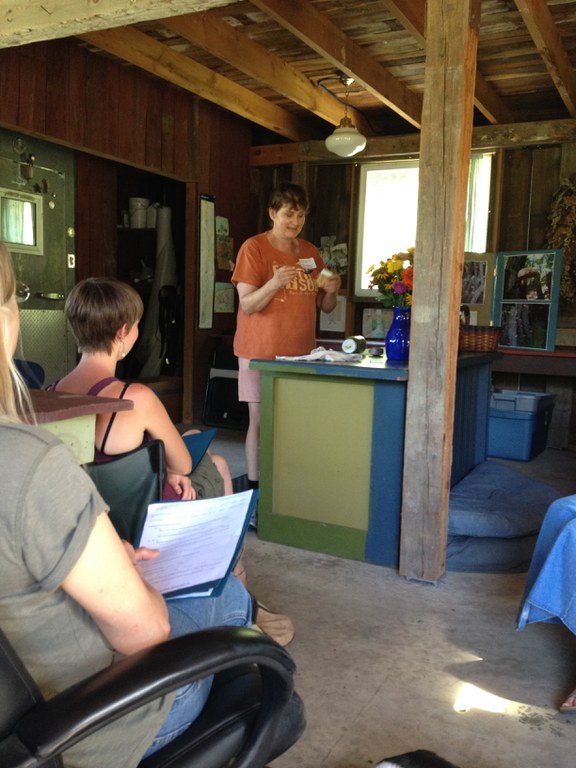Participants learned about the various value-added products made from Leah and John tewksbury's mushrooms, raspberries, tomatoes, herbs and other popcorn.
On July 22, 2015 Leah and Johnny Tewskbury hosted a PA-WAgN Field Day at the 45-acre Tewskbury Grace Farm that they have been cultivating for 20 years. The theme was how to diversify CSA and market tables. Leah and Johnny began by explaining that they have focused their efforts on providing a CSA that is of the highest quality possible while also maximizing efficiency on their farm. One consequence is that they currently only produce a fall/winter CSA, and they sell their additional harvest to local restaurants. They strive to provide a CSA basket that is beautiful, delicious, and convenient (e.g. clean, organized, peeled produce).
Leah and Johnny gave us a complete tour of their operation - including the greenhouse, bookkeeping, beds, and walk-in refrigerator that they created from a Coolbottm and air conditioner. They also described the barn loft that they use for drying onions, garlic, etc. Our group was especially interested in the "English blocking" seed starting system that Leah uses in order to avoid plastics. Another impressive aspect was the Tewksburys' detailed record-keeping system including notes on planting, fertilizing, crop rotation, bed maps, and more. They noted that they keep handwritten notes during the growing season, and enter all information into their computer during the winter months. This is also the time when they focus on research pests, challenges, and innovative farm practices.
Toward the end of the tour, Senior Extension Associate Kathy Demchack from Penn State taught us about caring for brambles. She offered some general advice such as spacing the plants five feet apart, cutting canes within 1-2 feet beyond the top of the trellis (but only 3-4" into soft tissue), and only pruning when you expect 3-4 days of dry weather to follow. Failure to follow these guidelines could result in the plants contracting cane blight. Kathy also described certain visual cues that warn of pests or disease such as curling, puckering yellow leaves or little white speckles on the leaves (known as stippling).
Kathy also pointed out an important misunderstanding of many bramble farmers. Dead canes often possess holes at the top that are usually evidence of natural pollinators laying eggs in the canes. Well-intentioned but misinformed farmers might mistake the holes for cane borers and burn the canes to kill the pests. However, these farmers are actually killing native pollinators that could benefit their entire farm. This underscores the importance of knowing how to decipher between pests, disease, and beneficial insects.
Last, Kathy spoke with us about the spotted winged drosophila. She described the life cycle and told us that berries that become juicy before they are overly ripe are an indication of drosophila larvae. She divulged that, if present in berries, the larvae are harmless to eat (and may in fact be nutritious); however, they are gross to see and they reduce the shelf-life of the berries. To avoid these pests, Kathy recommended picking berries daily and using a spray on the plants to kill the pests. Once picked, refrigerate berries at 32 degrees Fahrenheit.
During and after our tour, Johnny and Leah described some of the ways that they have added value to their CSA shares. First, they began planting fruit trees and brambles because "people can never get enough organic fruit and berries." They also grow shiitake mushrooms in a wooded section of their farm. CSA members receive them both fresh and dried. When the Tewksburys had the opportunity to acquire an additional wood lot adjacent to their farm, they realized that they could tap the maple trees to include syrup in their CSA. This year they are beginning to include fresh rosemary and sea salt potato chips made locally from their organic heirloom potatoes, as well as popcorn - both on the cob and pre-popped. Other value-added items that Leah and Johnny put into their CSA shares include pickled Hawaiian ginger, jams, frozen berries, sauce, fruit leathers, dried herbs, and dried beans.
One general tip that Leah and Johnny offered is to make use of the local extension agent for identifying pests and disease. Another thing that Leah emphasized was to splurge and spend money upfront to make your farm more efficient and productive. For example, they used to make their own soil, which was very time consuming but saved a little bit of money. Eventually they realized that it was worth the extra money to buy Fertrell organic soil so they could save a great deal of time.
Pennsylvania Women's Agricultural Network
Address
302 Armsby BuildingUniversity Park, PA 16802
- Email pawagn@psu.edu
Pennsylvania Women's Agricultural Network
Address
302 Armsby BuildingUniversity Park, PA 16802
- Email pawagn@psu.edu


